Rome’s Invisible City
June 4, 2015
4.5 million people tuned into BBC1 on June 1 for ‘Rome’s Invisible City’, a documentary presented by Alexander Armstrong and featuring Mark Bradley explaining the finer points of strigils and hot walnuts. Here Dr Bradley describes his experience of being involved with the programme. It was 6 a.m. on a warm September morning when Alexander …
May Fest 2015
May 22, 2015
Undergraduates Karina Field and Juliet O’Brien describe their experiences helping out at May Fest, the University’s annual community open day. Karina: To prepare for our ‘Roman-style hairdressing service’, we learned several hairstyles from Janet Stephens’ YouTube tutorials. We then recreated parts of them for the children (and parents) that were willing. We offered two styles: two …
Women of Troy part 3
May 13, 2015
Lynn Fotheringham analyses some audience responses from last week’s production of Women of Troy. In my last post about the New Theatre’s Women of Troy, I mentioned that I was conducting some audience-research via an on-line questionnaire. I am interested in the different ideas of ‘authenticity’ that affect our response to representations of the ancient world, …
Q-Kolleg part 2
May 9, 2015
Following yesterday’s post on the most recent Q-Kolleg exchange, today Craig Goodere explains how the 2012/13 exchange has now resulted in the publication of a collection of essays by the participants. Fresh Perspectives on Graeco-Roman Visual Culture (2015; ed. Klose, Bossert & Leveritt) is a brand new collection of papers written, presented and published by …
Q-Kolleg 2015
May 8, 2015
Second-year undergraduates Karina Field and Tom Ingram describe their experiences hosting German students on Nottingham Classics’ exchange with the Humboldt Universität zu Berlin. When asked why we signed up for the Q-Kolleg programme, everyone gave essentially the same answer: to meet new people, and further our understanding of ancient art by experiencing German scholarship. …
Thucydides on student radio
May 6, 2015
Thucydides hit the airwaves of Radio 4 last week, but has also featured on the University of Nottingham student radio: James Gooderson describes his joint Independent Second-Year Project with Henry Boutflower. The term ‘marathon’ comes from the scene of a Greek victory over the Persians in 490 BCE. Herodotus tells of the Greek Pheidippides running …
Women of Troy
May 5, 2015
The second part of Lynn Fotheringham‘s preview of a student production of Women of Troy, opening this Wednesday at the New Theatre on University Park campus. With the New Theatre’s “Women of Troy” opening this Wednesday (6th May), I thought I’d whet your appetites with thoughts about some of the issues involved in staging …
‘Even mortal hands break a stone’: electoral promises and the epigraphic habit
May 3, 2015
[disclosure: the writer is a member of the Labour party; but here at Argonauts and Emperors we think of ourselves as the BBC of classical bloggery: Scrupulously Fair And Balanced] One feature of recent UK politics might be called ‘promise inflation’. Once there were pledges; during the referendum campaign in Scotland the promise made by …
Women of Troy
April 24, 2015
Lynn Fotheringham previews an imminent production of Euripides’ play at the University’s student theatre. A recent conversation I had with sisters Page and Eden Philips Harrington, director and producer of the New Theatre’s forthcoming production of Women of Troy (6th-9th May), revealed their creative ideas for dealing with the difficulties of putting on a Greek tragedy …
Comedy 2500
April 14, 2015
Alan Sommerstein commemorates a very special anniversary. It is exactly 2500 years ago this month that Athens saw its first official production of comic drama, at the Dionysia festival in the month of Elaphebolion (March/April), in the year that they called “the archonship of Telesinus” and we call 486 BC. (That’s 2500 years ago, not 2501 …

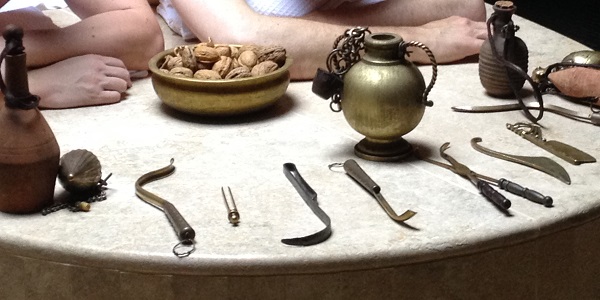
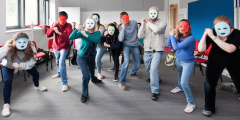
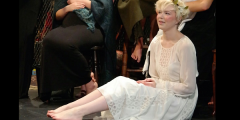
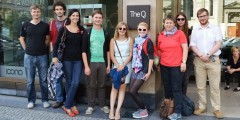
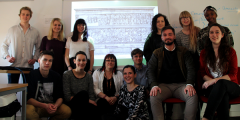

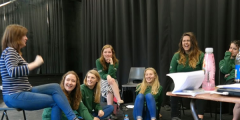
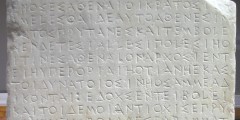
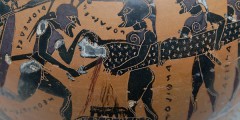
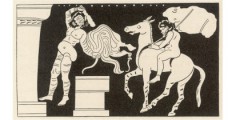
Recent Comments